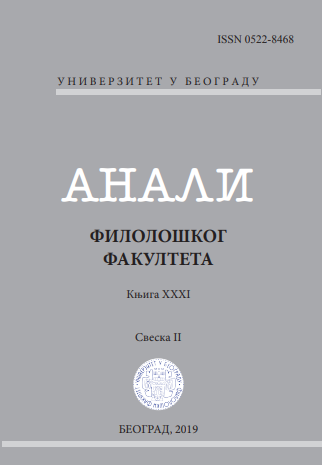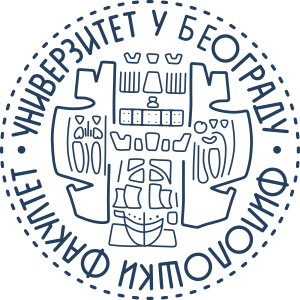Eстетски станује човек
DOI:
https://doi.org/10.18485/analiff.2019.31.2.4Keywords:
природно лепо, уметнички лепо, отвореност, недовршеност, homo aestheticusAbstract
Као и уметнички лепо, тако и природно лепо имају једну заједничку особину, односно телеологију, тачније телеологију без телоса – сврховитост без сврхе. Међутим, да би уметничко дело било створено, често се мора кренути од света живота чији витализам и органска форма, за једну струју мишљења, надмашују свет артефицијелних творевина. С друге стране, човеков нагон за лепотом, истанчаност естетског чула, наводи га да константно „улепшава“ свет у којем живи, смештајући лепоту у сферу идеалних моћуности (биће-по-себи-за-нас) и доживљавајући свет као недовршени естетски предмет, као још-не-лепоту. Очитост увида саусловљености животног реалитета и естетског простора, али не и њиховог узајамног суперпонирања, указује нам пре на један дијалектичан и нераскидив однос. Уколико, притом, сферу идеалних могућности разумемо као метафизички принцип у човеку самом, отуда долазимо и до хипотезе да се довршавање природног у естетском простору може разумети као отвореност бића и отвореност-ка-делу, што, служећи се феноменолошким речником, покушавамо испитати у овом раду кроз компаративну анализу феномена естетског и стварног.
Downloads
Published
How to Cite
Issue
Section
License

This work is licensed under a Creative Commons Attribution-ShareAlike 4.0 International License.
Authors who publish with this journal agree to the following terms:
- Authors are confirming that they are the authors of the submitting article, which will be published (print and online) in the journal Anali filološkog fakulteta by the Faculty of Philology, University of Belgrade (Faculty of Philology, Studentski trg 3, 11000 Belgrade, Serbia). Author’s name will be evident in the printed article in the journal. All decisions regarding layout and distribution of the work are in hands of the publisher.
- Authors guarantee that the work is their own original creation and does not infringe any statutory or common-law copyright or any proprietary right of any third party. In case of claims by third parties, authors commit their self to defend the interests of the publisher, and shall cover any potential costs.
- Authors retain copyright and grant the journal right of first publication with the work simultaneously licensed under a Creative Commons Attribution-ShareAlike 4.0 International License that allows others to share the work with an acknowledgement of the work's authorship and initial publication in this journal.
- Authors are able to enter into separate, additional contractual arrangements for the non-exclusive distribution of the journal's published version of the work (e.g., post it to an institutional repository or publish it in a book), with an acknowledgement of its initial publication in this journal.
- Authors are permitted and encouraged to post their work online (e.g., in institutional repositories or on their website) prior to and during the submission process, as it can lead to productive exchanges, as well as earlier and greater citation of published work.





